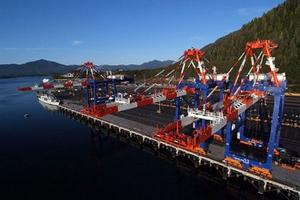Port securityU.S. agency critical of Canadian ports' security
The U.S. Federal Maritime Commission has issued a report criticizing Canadian sea ports for lax security. The commission reports singled out Prince Rupert port in British Columbia as an especially egregious case of insufficient security for U.S.-bound cargo

Container cranes at Prince Rupert Island seaport // Source: naol.ca
The U.S. Federal Maritime Commission has issued a report criticizing Canadian sea ports for lax security. The commission reports singled out Prince Rupert port in British Columbia as an especially egregious case of insufficient security for U.S.-bound cargo.
The report notes that Prince Rupert is not a CSI (Container Security Initiative) port. The CSI, initiated by DHS, is a program aiming to screen U.S.-bound cargo containers. “Vancouver, Montreal and Halifax are CSI ports; Prince Rupert is not,” reads the report obtained by the Canadian Press on the eve of its official release.
The Province reports that Canadian ports also do not use the “10+2” program, a program imposed on importers by U.S. Customs and Border Protection (CBP) since 2009. That program mandates that information about U.S.-bound cargo be transmitted to CBP at least forty-eight hours before goods are loaded onto ships destined for the United States.
The program is called 10+2 because ten pieces of information about the shipment must be provided by the importer, and two additional pieces of information from the shipping company.
“The 10+2 does impose a burden on importers to the United States that is not currently imposed on importers to Canada; it is anticipated that Canada will implement a similar program soon,” the report read. The report added: “By using a U.S. seaport, importers and steamship lines can have greater certainty as to the applicability of U.S. law for the entire movement.”
Prince Rupertis the West Coast pilot site for streamlining security measures under the much-heralded Beyond the Border initiative between Canada and the United States. Robin Silvester, chairman and CEO of the Vancouver port authority, told the Province earlier this week that containers entering the United States from Canada ports are, in fact, more secure than cargo shipped directly to American ports. “Every container that comes into Canada undergoes radiation screening, and then when they cross into the United States, they’re screened again as a further security measure. That doesn’t happen with containers entering the U.S. from other countries,” he said.
